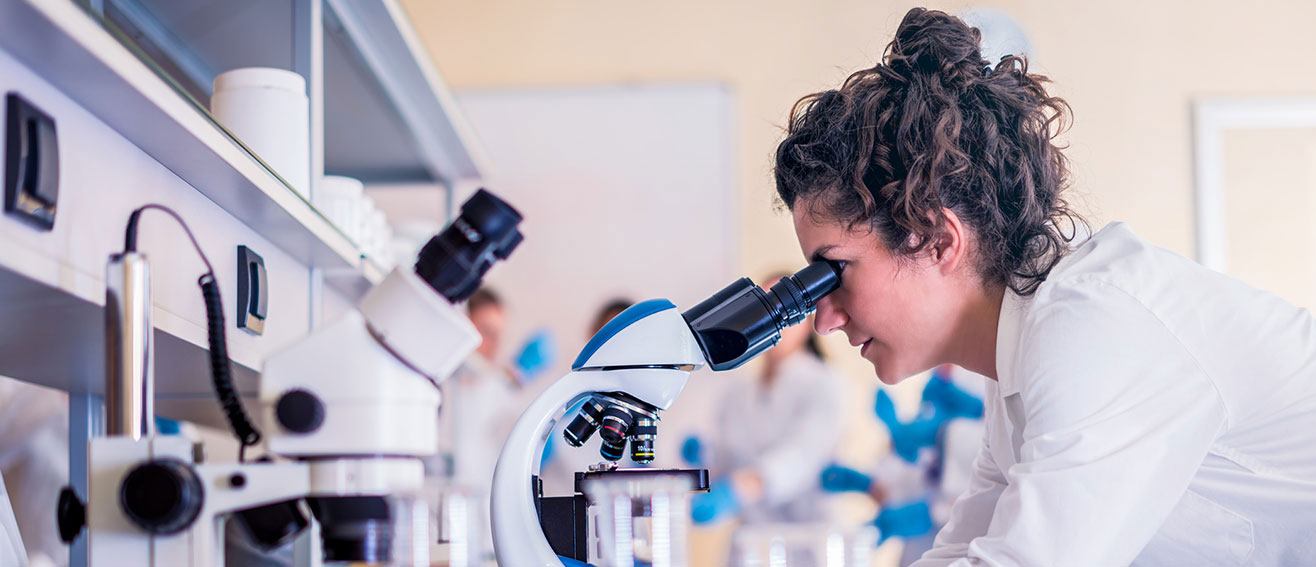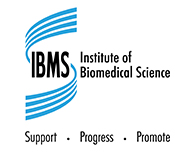Search our site...
Search module
Overview
Our Biomedical Science course is tailored for students like you, eager to excel in various biomedical science domains, from clinical pathology services in the NHS or private sector to cutting-edge research and the pharmaceutical industry, and even those considering a future in medicine post-graduation. What distinguishes us is not only our distinctive approach but also our dynamic team of educators who collectively contribute a wealth of experience, encompassing research and clinical expertise, and collaborate closely with employers to ensure that our curriculum remains highly pertinent to the continuously evolving job landscape.
Why Biomedical Science at LSBU?
- check-circle
- The Biomedical Science course is accredited by the Institute of Biomedical Science (IBMS) ensuring adherence to high standards recognition within the field.
- medkit
- Our team is very diverse with backgrounds encompassing research, clinical practice, industry, and education. This diversity offers students a comprehensive range of knowledge and guidance, assisting them in making well-informed decisions about their future careers early in the course.
- link
- We take pride in our strong connections with diverse stakeholders, including the NHS; research, and industry. This enables us to facilitate year-long placements for students enrolled in the 4-year course (with placement) if they wish.
- heart
- At the heart of our teaching methodology is a student-centered approach that caters to individual needs. The educational experience for our students is characterised by high interactivity, providing a personalised learning environment.
- smile
- Additional, we offer a BSc Hons in Biomedical Science with a Foundation year, accredited by IBMS. This serves as an excellent option for students who may not meet the direct entry requirements to Level 4.
This program is accredited by the Institute of Biomedical Science (IBMS)
The core focus of our course lies in nurturing students with vital practical skills and knowledge, equipping them for successful careers in their chosen sectors, whether it's healthcare settings as biomedical scientists, research, or industry roles. Our team is incredibly diverse, with each colleague's unique skills and knowledge complementing one another, spanning from research to clinical expertise, all aimed at achieving the best outcomes for our students.
The course provides an integrated approach towards understanding and in-depth knowledge of human health and disease, with embedded employability skills to meet the HCPC standards of proficiency. Students will acquire knowledge, intellectual and practical skills to understand human disorders and means of disease diagnosis and treatment through laboratory testing.
A distinctive feature of the course is that it introduces the students to state-of-the-art tools used in precision medicine, such as bioinformatics, genomics, transcriptomics, proteomics, and high-throughput drug screening geared towards molecular target identification and targeted therapeutics. Furthermore, students will be trained to apply their knowledge to offer solutions and to develop opportunities in a wide range of clinical settings and industries that require a broad understanding of biomedical science.
You may choose to embark on a placement year in IBMS training-approved laboratories, during which you will fulfil the IBMS Training Portfolio requirements. Upon returning and successfully completing the final year of your studies, you will become eligible to apply for registration as a Biomedical Scientist with the Health and Care Professions Council (HCPC). Additionally, you may choose to take on a placement year in research institutes or pharmaceutical companies.
According to the National Student Survey (NSS,2023), 87% of students found the teaching on this course to be excellent, along with 86% of learning opportunities and 87% of available learning resources. Additionally, 82% of students felt their voices were heard, 96% believed there was a proper balance between direct instruction and independent study, and 92% found that the course challenged them to achieve their best work.
What is the benefit of completing an accredited Biomedical Science course?
IBMS-accredited degrees provide you with the necessary knowledge and skills in biomedical science. These qualifications support your HCPC registration upon completion of the IBMS registration portfolio, enabling you to practice as a Biomedical Scientist in UK healthcare laboratories. It's important to note that the title of "Biomedical Scientist" is protected, and without HCPC registration, you cannot work under this title. For additional details, please refer to the following link Accredited degrees - Institute of Biomedical Science (ibms.org)
Meet Jessica - our Biomedical Science Student by watching the video below:
| ModeFull-time | Duration3 years (4 with sandwich year) | Start dateSeptember | Application codeC501 | Application method UCAS |
| ModeFull-time | Duration4 years (4 with Placement) | Start dateSeptember | Application codeC500 | Application method UCAS |
Location
London South Bank University student union is located at 103 Borough Rd, London SE1 0AA.
If you are visiting our Southwark Campus, you may wish to use our downloadable campus map (PNG File 466 KB). For information on accessibility, see our DisabledGo access guides. See our location page for more details.
Entry Level Requirements
For the degree program, you should have 104-112 UCAS points
This can be achieved through one of the following routes:
- A-Level qualifications with grades BCC, which must include Biology or Human Biology, and a second STEM subject chosen from Chemistry, Physics, Mathematics, Further Mathematics, Statistics, or Psychology.
- Alternatively, you may qualify with a BTEC Extended Diploma in a relevant Science field such as Science, Life Science, Applied Science, Medical Science, or Forensic Science, with grades ranging from DMM to DDM.
- Another pathway equivalent to Level 3 Science qualifications for example International Baccalaureate.
- If you are considering the degree program with a foundation year, a minimum of 64 UCAS points is required.
- Applicants must have a minimum of 5 GCSEs, each with grades at least C (4) or above, including Mathematics, Double or Triple Science, and English Language.
- English language qualifications for international students: IELTS score of 6.0 or Cambridge Proficiency or Advanced Grade C. Note: International students enrolled in a sandwich course and completing an IBMS registration portfolio must have obtained an IELTS score of at least 7.0, which should not be older than 2 years before applying for HCPC registration (www.hcpc-uk.org).
If you do not meet the entry criteria above we also review any previous skills, knowledge or experience you have gained outside of your education and are happy to talk through any extenuating circumstances you feel relevant.
Visit UCAS for guidance on the tariff.
Choose your country
Select country here:
Missing English and Maths qualifications?
If you do not have the required English and Maths qualifications needed to satisfy the entry requirements for this programme, we have courses available at our partner College that you can take to upskill in these areas. Find out more at South Bank College.
Advanced entry
If you have already completed some studies at another university, we may be able to consider you for advanced entry. Please see our advanced entry page for more information.
United Kingdom
£9250
Tuition fees for home students
International
£15900
Tuition fees for international students
Tuition fees are subject to annual inflationary increases. Find out more about tuition fees for Undergraduate or Postgraduate courses.
-
Full-time
full-time
BSc (Hons) Biomedical Science (FT) - Year 1
UK fee: £9250 International fee: £15900 AOS/LSBU code: 5896 Session code: 1FS00 Total course fee: UK: £27750 International: £47700 BSc (Hons) Biomedical Science (With Placement) (FT) - Year 1
UK fee: £9250 International fee: £15900 AOS/LSBU code: 5895 Session code: 1FS00 Total course fee: UK (excluding any optional years): £27750 UK (including any optional years): £27750 International (excluding any optional years): £47700 International (including any optional years): £47700 BSc (Hons) Biomedical Science (FT) - Year 2
UK fee: £9250 International fee: £15900 AOS/LSBU code: 5896 Session code: 2FS00 Total course fee: UK: £27750 International: £47700 BSc (Hons) Biomedical Science (With Placement) (FT) - Year 2
UK fee: £9250 International fee: £15900 AOS/LSBU code: 5895 Session code: 2FS00 Total course fee: UK (excluding any optional years): £27750 UK (including any optional years): £27750 International (excluding any optional years): £47700 International (including any optional years): £47700 BSc (Hons) Biomedical Science (FT) - Year 3
UK fee: £9250 International fee: £15900 AOS/LSBU code: 5896 Session code: 3FS00 Total course fee: UK: £27750 International: £47700 BSc (Hons) Biomedical Science (With Placement) (FT) - Year 3
UK fee: £0 International fee: £0 AOS/LSBU code: 5895 Session code: 3FS00 Total course fee: UK (excluding any optional years): £27750 UK (including any optional years): £27750 International (excluding any optional years): £47700 International (including any optional years): £47700 BSc (Hons) Biomedical Science (With Placement) (FT) - Year 4
UK fee: £9250 International fee: £15900 AOS/LSBU code: 5895 Session code: 4FS00 Total course fee: UK (excluding any optional years): £27750 UK (including any optional years): £27750 International (excluding any optional years): £47700 International (including any optional years): £47700
For more information, including how and when to pay, see our fees and funding section for undergraduate students.
Please check your fee status and whether you are considered a Home, EU or International student for fee-paying purposes and for our regulatory returns, by reading the UKCISA regulations.
See our Tuition Fees Regulations (PDF File 391 KB) and Refund Policy (PDF File 775 KB).
Possible fee changes
The University reserves the right to increase its fees in line with changes to legislation, regulation and any government guidance or decisions.
The fees for international students are reviewed annually and the University reserves the right to increase the tuition fees in line with the RPIX measure of inflation up to 4 per cent.
Scholarships
We offer several types of fee reduction through our scholarships and bursaries. Find the full list and other useful information on our scholarships page.
International students
The course is not currently open to international students.
International (non Home) applicants should follow our international how to apply guide.
Home
| Mode Full-time | Duration 3 years (4 with sandwich year) | Start date September | Application code C501 | Application method UCAS |
| Mode Full-time | Duration 4 years (4 with Placement) | Start date September | Application code C500 | Application method UCAS |
Accommodation
Once we have made you an offer, you can apply for accommodation. You can rent from LSBU and you’ll deal directly with the university, not third party providers. That means we can guarantee you options to suit all budgets, with clear tenancy agreements and all-inclusive rents that include insurance for your personal belongings, internet access in each bedroom and on-site laundry facilities.
Or, if you’d rather rent privately, we can give you a list of landlords – just ask our Accommodation Service.
Read more about applying for accommodation at LSBU.
Finance
You don't need to wait for a confirmed place on a course to start applying for student finance. Read how to pay your fees as an undergraduate student.
Prepare to start
Applicant events
After you’ve received your offer we’ll send you emails about events we run to help you prepare for your course.
Enrolment
Before you start your course we’ll send you information on what you’ll need to do before you arrive and during your first few days on campus. You can read about the process on our Enrolment pages.
Foundation Year
If you would like to study one of our science degrees at LSBU but are not yet ready to join the first year of a BSc (Hons) course, you can include an extra foundation year within your chosen degree. Please see the link for the Foundation Year.
BSc Biomedical Science aims to enable you to understand the biology of human health and disease, including the basic knowledge of human anatomy and physiology, cell biology, genetics and molecular biology, biochemistry, immunology and microbiology, as well as a practical grounding in data analysis, statistics and numeracy.
You will have the opportunity to study the following modules:
Year 1
- Biology of the cell
This module provides a foundation for further studies in all areas of biomedical science. The cellular organisation of living organisms is introduced, as well as the structure and function of prokaryotic and eukaryotic cells, and the cell as the fundamental unit of life. Focus will be on the regulation of cell division, cell cycle, cell death, cell specialisation and cooperation, stem cells and their self-renewal and differentiation. All this will be introduced in context of human health and disease. In addition, current research approaches and methods for studying cells and manipulating genes will be highlighted. - Human anatomy and physiology
This module will develop student knowledge and understanding of the human anatomy and physiology. It will explore the structure, function, neurological and hormonal control of the human body, its component parts. Major body systems will be studied (musculoskeletal, circulatory, respiratory, digestive, renal, urogenital, nervous, endocrine) and their relationship to each other will be looked into. The physical and chemical principles that underlie physiological function and metabolic processes will be reviewed. Overall, this will lead to appreciation of human functioning through understanding of physiological systems and their integration. - Microbiology and Immunology
This module introduces you to the microbial world, through the historical significance of microbiological discoveries, fundamental concepts of microbiology and how these are applied, especially in relation to medical microbiology. In parallel, students will undertake a series of practical activities to develop Good Laboratory Practice, Aseptic Techniques and an understanding of Standard Operating Procedures. - Biochemistry
This module will cover key chemical principles relevant to biological systems through understanding of the four main classes of biomolecules, namely, carbohydrates, proteins, lipids and nucleic acids. It will examine the structure, types, functions, synthesis (anabolism) and degradation (catabolism) of each biomolecular class and their regulation. The module will draw pointers to metabolic pathways into which these molecules and/or their component monomers feed and overview the interconnections between the biochemical pathways mediated via these molecules. The module will also cover the principles of selected basic techniques used to detect these molecules in the laboratory and perform a related laboratory practical. - Genetics and molecular biology
This module will introduce the fundamentals of genetics and molecular biology. It will explore the underlying principle of the central dogma of molecular biology while defining the structures and functions of DNA, RNA, proteins and human genes, up to chromosome level. Principles and modes of gene inheritance in human will be discussed. The basics of genetic variation in human will be extended to understand population genetics and evolution. Specific examples of genetic disorders with biomedical significance will be cited and studied. Moreover, molecular events that govern cell function such as the epigenetic mechanisms will be highlighted. - Employability Skills for Biomedicine Scientists
This Level 4 module is specifically structured to assist our students in developing the essential soft skills outlined in the HCPC standards. It provides guidance on crafting CVs, cover letters, utilising LinkedIn, and introduces our students to the roles of IBMS and HCPC. This equips them with the knowledge needed to make informed decisions when selecting optional modules in Levels 5 and 6, aligning their studies with their desired career pathway, whether it involves working as biomedical scientists in healthcare services, research, or industry after graduation.
Year 2
- Human Haematology and Clinical immunology
This module will compare the elements that constitute blood in normal and diseased states. It will review the process (structure function and production of blood cells) and regulation of normal haemostasis. Further on, it will explore the pathological nature, diagnosis and laboratory investigation of anaemias, haematological malignancies, haemorrhagic and thrombotic diseases. Knowledge will be extended to the understanding of the structure and function of individual components of the immune system in defining innate and acquired immunity. Moreover, acute and chronic inflammatory states will be discussed, as well as the cause and consequences of abnormal immune function, neoplastic diseases and transplantation reactions together with their detection, diagnosis and treatment. - Bioinformatics and Skills for Biomedical Scientist
This module is intended to develop your understanding and skills in the analysis and management of high volumes of biological data using computational and statistical methods. It will provide the knowledge on the applications of bioinformatics and biostatistics to a range of disciplines in biology and medicine. The students will gain practical experience in how to use specialised software in bioinformatics and biostatistics and will receive an introduction to the OMICS world. In addition, students will learn to design a research project, and data analysis in the area of biomedical science. It will provide knowledge about main research principles and methodologies for data collection and analysis. The students will gain practical experience in developing a research proposal and analysing data with a variety of software packages. - Cellular pathology and imaging
This module is intended to develop your understanding and skills in microscopic examination of normal and abnormal cells (cytopathology) and tissues (histopathology) for indicators of disease. It will also provide knowledge about principles and methodologies of different microscopic imaging techniques, including light and electron microscopy, as well as fluorescent and confocal microscopy. You will gain practical experience in the preparation of tissue slides and in the histo- and cyto-pathological examination of cells and tissues using a variety of techniques. - Clinical biochemistry and blood transfusion
This module will cover the principles of clinical biochemistry and blood transfusion. Under clinical biochemistry, the module will explore the investigations involving the functionality and dysfunctionality of human systems by measuring biochemical markers in different sample types. Under the topic of blood transfusion, the module will cover the genetics, structure and function of red cell antigens, while exploring the significance of blood group antigens and antibodies and the selection of blood components in safe transfusion. - Professional Skills for Biomedical Scientists
The module is designed to help students acquire professional, subject-specific, and transferable skills essential for biomedical science through understanding of healthcare delivery within the NHS, and the role of healthcare science professionals. The module will provide knowledge about quality assurance in clinical settings, workflow in pathology laboratories, and methodologies for data collection and analysis. The module is focused on service need, patient care/pathway and continuous service improvement through combining/integrating both academic and work-based biomedical science learning. Through interactive workshops, practical sessions, and through personal tutors, feedback on work is delivered to students to enhance their employability. The laboratory sessions also allow students to gain experience with basic scientific practises, such as documenting and analysing data, meeting deadlines, and communicating effectively. The module offers a unique approach to learning by providing opportunities for professional development. - Stem Cell and Developmental Biology:
The module aims to introduce students to an up-to-date and rapidly changing field of stem cell research, from fundamental principles to the practicalities of regenerative medicine. The module will cover topics such as the developmental origin of stem cells, exploring the different types of stem cells, their biological regulation, and tissue-specific functions as well as how dysfunction of these processes can lead to disease. The module also will cover fundamental principles of how stem cells can be used to regenerate tissues, including cellular reprogramming, and how these concepts can be applied in research and therapeutics towards the development of novel therapies for the treatment of disease. - Introduction to Pharmacology
This module will introduce the chemical nature, classification and mode of actions of drugs and medicinal products. The biological aspects of drug chemical interactions with receptors of endogenous signalling pathways will be explained. The different methods for development of new drugs will be discussed. Definition, classification, mode of actions and effect of toxic substances on human cells will be explained.
Year 3
- Clinical OMICS and precision medicine
This module will cover Genomics and other OMICS, and their applications in precision medicine, and it covers the topics required in clinical genetics by IBMS for accreditation. It will begin with a review of the structure and function of genes and chromosomes, which will set the ground for the following four themes – (i) Genomics (including mapping, sequencing technologies, the human genome project, and model organisms), (ii) Introduction to bioinformatics and databases for sequence analysis, (iii) Proteomics (including protein structure and function, analysis of protein sequences, structural and/or functional motif recognition, technologies for the analysis of the proteome), (iv) Introduction to other OMICS (including transcriptomics and metabolomics). - Medical and Public Health Microbiology
This module will develop the student’s knowledge of infectious diseases, their mechanism of pathogenesis, the interaction between microbe and host in the different human systems. This module is intended to develop students’ understanding and skills of population data analysis in the area of clinical microbiology. They will understand the impact of infectious diseases on public health, the mechanisms of prevention, control, and management of infectious diseases outbreaks. In parallel, students will understand and practice the principles of sample processing (collection, transport and storage), microbe isolation, a variety of techniques used for microbe identification, and diagnosis in the settings of clinical microbiology labs, applying Good Laboratory Practice, Aseptic Techniques and following of Standard Operating Procedures - Research Project in Biomedicine
This module is intended to develop competencies and skill-sets needed to undertake independent scientific research. The module work consists primarily of either a laboratory‐based, meta-analysis or Bioinformatic investigation on a defined pre-selected topic. The students present their findings in form of a scientific paper that is assessed and subjected to a presentation and viva voce examination. Students are expected to manage their own research activity with tutorial support from their research supervisor.
In addition, you will select two optional modules:
- Clinical nutrition and the Microbiome
Clinical nutrition encompasses the understanding of the role of diet in the causation, prevention and management of disease. Microbiome is the microbiota in different body compartments. This module will examine these themes through examination of a range of disease states and associated nutritional perspectives. The role of nutrition and the microbiome in clinical science and the hospital setting will be examined. - Drug design and development
This module will introduce the chemical and pharmaceutical concepts which give the basis of the design and development of drugs, how drugs are sourced, developed and manufactured, and how the quality of these drugs is assured to ensure patient safety. This includes an introduction to natural and synthetic products using organic and inorganic chemistry for drug discovery and formulation. Students will gain practical skills in the formulation of drugs and performing pharmaceutical calculations. Students will be introduced to the processes of quality, safety, delivery and dispensing of drugs.
Course changes and regulations
The information on this page reflects the currently intended course structure and module details. To improve your student experience and the quality of your degree, we may review and change the material information of this course.
Please note: Optional modules only run if there is enough demand. If we have an insufficient number of students interested in an optional module, that module will not be offered for this course.
Foundation Year
If you would like to study one of our science degrees at LSBU but are not yet ready to join the first year of a BSc (Hons) course, you can include an extra foundation year within your chosen degree. Please see the link for the Foundation Year.
Careers
Employability Service
At LSBU, we want to set you up for a successful career. During your studies – and for two years after you graduate – you’ll have access to our Employability Service, which includes:
- An online board where you can see a wide range of placements: part-time, full-time or voluntary. You can also drop in to see our Job Shop advisers, who are always available to help you take the next step in your search.
- Our Careers Gym offering group workshops on CVs, interview techniques and finding work experience, as well as regular presentations from employers across a range of sectors.
Our Student Enterprise team can also help you start your own business and develop valuable entrepreneurial skills.
All the required biomedical sciences subject areas are covered as core modules in this course. In other words, all students will gain the subject knowledge, practical and transferable skills that enable them to work as BMS, regardless of their chosen career.
In addition, the course allows students, through optional modules and/or University shared modules, to gain knowledge in areas, such as clinical, pharmaceutical sciences, as well as in entrepreneurship.
Upon successful completion of the Biomedical Science course, you have several potential career paths to explore. You can register as a Biomedical Scientist with the HCPC if you have completed the IBMS registration portfolio. Alternatively, you can apply for a trainee Biomedical Scientist position in NHS or private IBMS approved laboratories, consider applying for medical school if you meet the requirements for graduate entry medicine, or pursue a career in biomedical research and the pharmaceutical industry.
Teaching and Assessment
The course delivery includes blended learning which allows you to experience the same high-quality teaching, but with flexible modes of delivery. All modules offered at the first year are delivered through a blend of keynote lectures, tutorials, group work, flipped learning, and problem-based learning activities. Many of the first year modules develop and assess practical skills.
All modules employ teaching methods that encourage students to consider and challenge the evidence with which they are presented.
A wide range of subject-related resources are available within the LSBU Library. This includes access to textbooks, E-journal subscriptions, scientific databases, interactive e-learning platforms and multimedia. Moreover, students have access to site-licensed software and assisstive technologies to support their learning (if registered for Disability and/or specific learning difficulties).
There are a total of 4 teaching and research laboratories that provide a rich learning environment for combining theory and practice. Each contains state-of-the art equipment to support delivery across all core and specialist modules.
The course will use a blend of formative and summative assessment, as well as self- and peer assessment. All career pathways share a similar variety of summative assessment, while the majority also include a final exam. Most modules carry several points of assessment.
People profiles
-
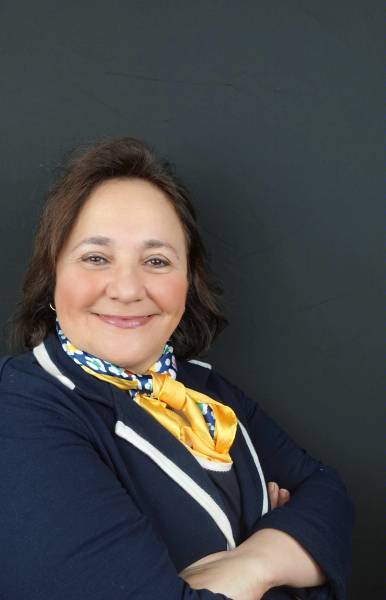
Professor Eiman Abdel Aleem
Applied Sciences -
.jpg)
Ms Alison Alvarez Nee
Applied Sciences -

Dr Claire Atkinson
Applied Sciences -
a.jpg)
Dr Janet Aylott
Applied Sciences -
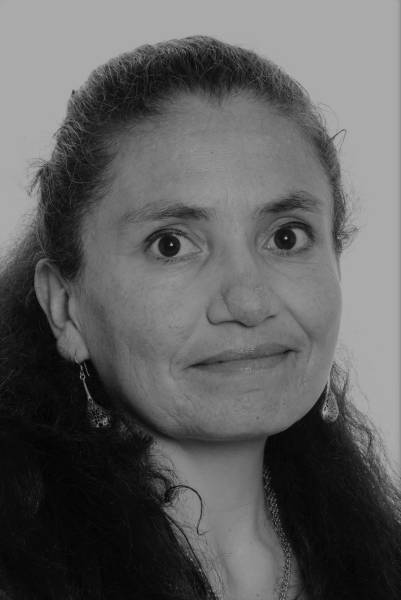
Dr Valentina Caputo Galarce
Applied Sciences -

Dr Rachel Grant
Applied Sciences -
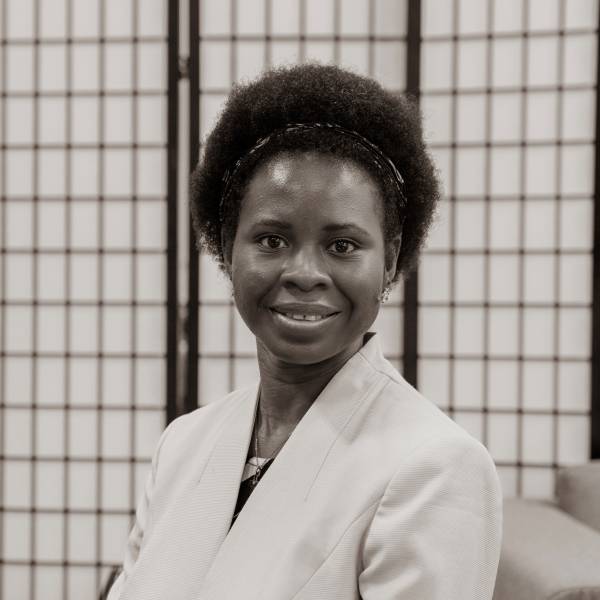
Dr Ruth Gyereh
Applied Sciences -
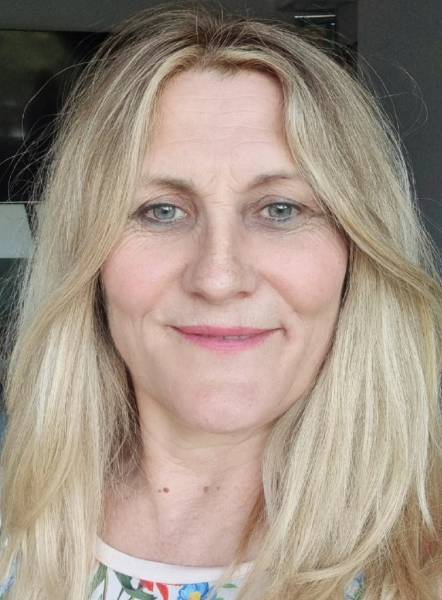
Ms Shpresa Haliti
Applied Sciences -
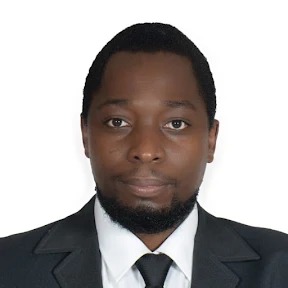
Mr Stuart Lutimba
Applied Sciences -
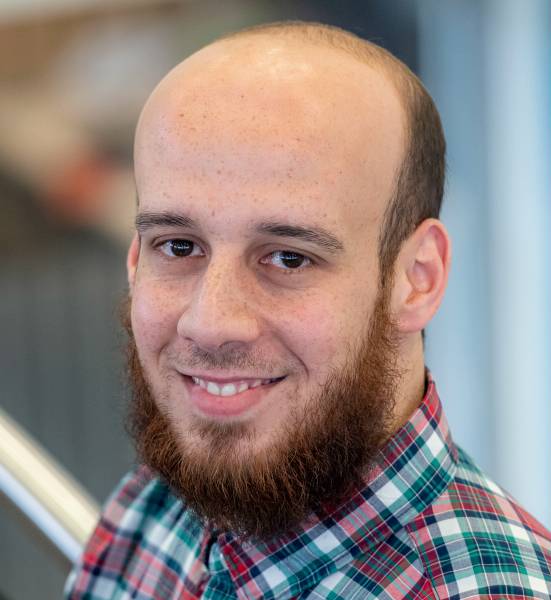
Dr Mohammed Mansour
Applied Sciences
